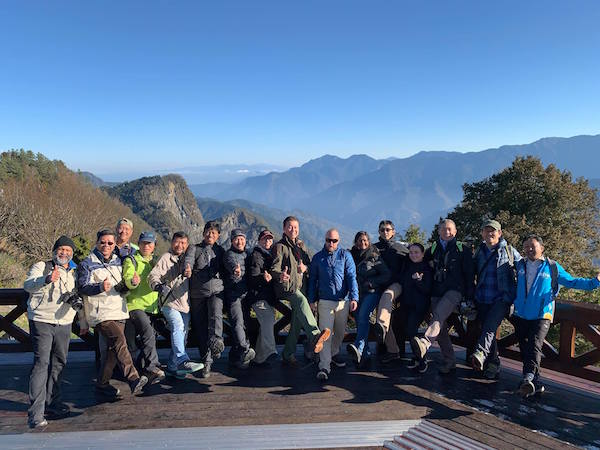The joint declaration by the Asian Ecotourism Network and Taiwan Ecotourism Association serves to outline the judicious management of indigenous peoples while reaping benefits for the ecotourism industry and communities alike. By Mallika Naguran.
CHIAYI, 30 January 2019. In a step towards upholding the sustainable development of indigenous communities through ecotourism, a joint declaration was signed by the Asian Ecotourism Network (AEN) and Taiwan Ecotourism Association (TEA).
The two organisations came together on 23 January 2019 to carve out a set of sustainability principles on which mountain ecotourism can be built. This was at the end of AEN members’ five-day visit to central Taiwan, where the last three days were spent on inspecting indigenous villages and tourism offerings in the popular Alishan mountains.
Members of the Asian Ecotourism Network and Taiwan Ecotourism Association inspected Alishan mountain tourism sights and indigenous villages as part of ecotourism standards technical visit.
The Alishan National Forest Recreation Area, located between 2,000 to 2,700 metres in central Taiwan, is famous for five main tourism attractions: the sunrise, sea of clouds, sunset, forest, and forest railway. However, it is very much a living and sacred place for the aboriginal people of Taiwan.
There are as many as 14 different indigenous tribes, if one can simplify the classification of these people who have lived in Taiwan for more than 6,000 years. They still hold on to their cultures and distinct dialects (even as a few, sadly, have died out).
Which is why it is important to preserve their way of life even as tourism helps to build livelihoods and boost the local economy. Such matters were discussed before the declaration was inked.
The AEN delegation to Taiwan comprised board and ordinary members from 12 countries including Cambodia, Thailand, Hong Kong, India, Japan, Lao, Malaysia, New Zealand, Singapore and Taiwan.
Speakers from these countries had also addressed a packed room at the inaugural AEN Taiwan Conference themed “Mountain Ecotourism and Indigenous People” held at the Chukou Visitor Centre in Alishan on 19 January 2019.
Mountain ecotourism and indigenous people were the gists of speeches and discussions at the very first conference organised by the Asian Ecotourism Network in Taiwan in partnership with the Taiwan Ecotourism Association on 23 January 2019 in Chiayi, Taiwan. Courtesy: AEN/TEA
“That was AEN’s first ecotourism conference and it was held in partnership with Taiwan Ecotourism Association. Through the discussions on mountain ecotourism with an emphasis on indigenous people, AEN jointly announced with TEA an AEN Alishan Declaration on Indigenous People,” said Masaru Takayama, Chairperson of AEN.
The AEN Alishan Declaration on Indigenous People states that participants shall Recognize the importance of the rights of the indigenous peoples, and respect their choices to live in harmony with the practices of ecotourism without negatively affecting them or their distinctive cultures and relationships with the land and natural environment. (Read the rest of the statements on the AEN website here.)
AEN members will refer to the declaration as part of the “compulsory standards” as they engage in sustainable tourism, added Takayama.
Members of the Asian Ecotourism Network or AEN mingled with the Tsou tribal leaders up in Alishan mountains of Taiwan to learn more about their culture and traditional ways.
“A lot of times, the nature-based activities can overlap with the ancestral land of the indigenous communities and we, AEN, find it vital to share the benefits and foster mutual respect when practising any types of tourism,” explained Takayama on the reasons for arriving at the declaration.
Members can now refer to the AEN Alishan Declaration on Indigenous People as part of the standards in sustainable tourism.
In 2001, Alishan mountain was designated as a national forest recreation area, with an administration established to preserve the natural environment and in the meantime, promote sustainable tourism.
“Ecotourism is growing in a lot of countries in Asia. The declaration is indented to set out principles so everyone in Asia or at least, the members of AEN, will understand what is the proper way to pursue healthy ecotourism development,” said Albert Teo, Vice Chairman of AEN, according to Taiwan News Network.
“Provisions of the declaration envision that indigenous communities will not be exploited by tourism programs, and that the communities will be directly involved in interpreting and presenting their cultures,” said Teo.
“All stakeholders can benefit from ecotourism, and all stakeholders and the government can ensure that the cultures of minorities are taken into consideration” in terms of promoting ecotourism,” added Teo.
“It has been a great opportunity for AEN to ponder upon the issues related to mountain ecotourism and indigenous people. Asia is known for its biodiversity but at the same time we also embrace diversity in human races, ethnicity, culture, etc.,” said Mr. Takayama.
“We hope that other practitioners will also embrace the Declaration to ensure our assets be passed on to the generations to come,” he added.
Founded in 2014, AEN is an organisation that promotes ecotourism standards for the conservation of the environment and communities within Asia Pacific. It provides training programmes and marketing events to facilitate learning and business opportunities among members.



